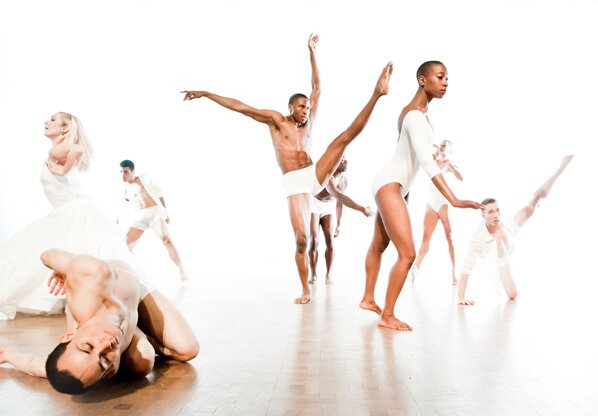
How would you describe love? Some ideas might include perhaps a yearning for close companionship, an irresistible attraction, tenderness, touching, feeling, warmth, affection, closeness, sharing, embraces and kisses.
Looking for these in Donald Byrd’s new work, Love, in performance this and next weekend at Daniels Hall, I saw some, usually in fleeting moments and a few longer, such as the sequence with five couples attached mouth to mouth but without apparent warmth. Indeed the only facial expressions of warmth I saw came from the eloquent dancer Jereboam Bozeman, the tenderness in a head dropping on a partner’s shoulder, a brief embrace, an occasional caress.
Mostly, it’s a work of non-stop movement for first one dancer, then two, then in varied groupings of up to the entire complement of eleven dancers on two connected square stages. One is slightly higher than the other, with most of the church pews pushed aside in what used to be the Methodist Church at Fifth and Marion. Pews for the audience ranged around three sides of one square, but it was possible to see every dancer from anywhere.
The men were in white stretch briefs and sometimes an open longsleeved white shirt which obscured lines and seemed to get in the way; the women in one- or two-piece swimsuits or long shifts and at the end, incongruous long, thin tutu skirts which bunched up, also all white.
The work was mostly about superb athletes in abstract movement, dancers in their fluidity and the way one movement flowed into the next, at times almost reaching pure acrobatics with many leg lifts and somersaults. At others, the movement verged on contortionism, saved by the extraordinary smoothness, apparent ease and beautiful control displayed by all the dancers and epitomized by Vincent Michael Lopez and Ty Alexander Cheng.
In the third section, six men lifted Jade Solomon Curtis high overhead, twisting, turning, swooping, and arching her in a myriad shapes, the most absorbing sequence of the performance. Had she not been so strong and so flexible, and had the supporters’ hands not all been in the right place at the right time, some moves could have been seen as downright dangerous in terms of breaking her back.
But what had this to do with love?
Similarly, Benjamin Britten’s solo Cello Suites Nos. 1-3 were music for Love, played live by Denise Djokic. She draws a warm resonant sound from her instrument and gave a fine performance. However, the dance seemed to have no connection to the music and vice versa.